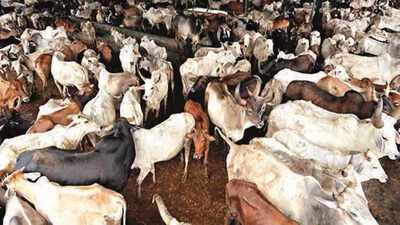- News
- City News
- hubballi News
- Lumpy skin disease claims lives of over 8,000 cattle in Karnataka
Lumpy skin disease claims lives of over 8,000 cattle in Karnataka

The severity of lumpy skin disease (LSD) has continued in Karnataka that has counted 8,446 dead cattle. The Kalaburagi and Belagavi divisions are severely affected.
HUBBALLI: The severity of lumpy skin disease (LSD) has continued in Karnataka that has counted 8,446 dead cattle. The Kalaburagi and Belagavi divisions are severely affected.
According to a report, till November 8, the Ballari district of Kalaburagi division reported the highest number of cattle deaths at 2,263, followed by Haveri district in Belagavi division where 1,757 cattle died. In Udupi and Kodagu, no cattle is affected by the disease. In Belagavi district, the toll has increased, mounting to 1,274. In Gadag 604 and in Koppal 363 deaths have been reported.
Similarly, in Davanegere and Chitradurga districts of Bengaluru division, 469 and 632 cattle deaths have been reported, respectively.
Till date ,122,506 cattle have been affected of which 67,319 have recovered. In all, 9,053 villages across 181 taluks have cattle suffering the lumpy skin disease.
Salma Fahim, the secretary of the animal husbandry department, said that ICAR-NIVEDI and KVAFSU scientists have analysed the disease epidemiology. According to them, deaths have been found among recovered animals too as the treatment protocol followed was a surface application to the wounds. The disease festered because it required antibiotic treatment. After this, doctors have given refresher training. Deaths are also higher among calves that are less than 4 months old as they have low immunity.
The findings indicate high correlation between vaccination and reduced mortality. Hence, the department has stepped up the vaccination rate, Fahim said.
Sources in the department said that initially the death rate was high in Haveri district but now in Bellary, the death rate is highest.
The animal husbandry department, which is facing an acute crunch of staff across the state, is putting in all effort to vaccinate the cattle and has vaccinated almost 29.5 lakh cattle.
N H Konaraddi, a former MLA and farmer leader, said this was a government failure. “For the current situation, the government is responsible. In the initial days, if the government had taken the disease seriously, livestock could have been saved. The government, without delaying much, should appoint doctors and other required staff at the veterinary hospitals and take appropriate steps to vaccinate livestock,” he said.
According to a report, till November 8, the Ballari district of Kalaburagi division reported the highest number of cattle deaths at 2,263, followed by Haveri district in Belagavi division where 1,757 cattle died. In Udupi and Kodagu, no cattle is affected by the disease. In Belagavi district, the toll has increased, mounting to 1,274. In Gadag 604 and in Koppal 363 deaths have been reported.
Similarly, in Davanegere and Chitradurga districts of Bengaluru division, 469 and 632 cattle deaths have been reported, respectively.
Till date ,122,506 cattle have been affected of which 67,319 have recovered. In all, 9,053 villages across 181 taluks have cattle suffering the lumpy skin disease.
Salma Fahim, the secretary of the animal husbandry department, said that ICAR-NIVEDI and KVAFSU scientists have analysed the disease epidemiology. According to them, deaths have been found among recovered animals too as the treatment protocol followed was a surface application to the wounds. The disease festered because it required antibiotic treatment. After this, doctors have given refresher training. Deaths are also higher among calves that are less than 4 months old as they have low immunity.
The findings indicate high correlation between vaccination and reduced mortality. Hence, the department has stepped up the vaccination rate, Fahim said.
Sources in the department said that initially the death rate was high in Haveri district but now in Bellary, the death rate is highest.
The animal husbandry department, which is facing an acute crunch of staff across the state, is putting in all effort to vaccinate the cattle and has vaccinated almost 29.5 lakh cattle.
N H Konaraddi, a former MLA and farmer leader, said this was a government failure. “For the current situation, the government is responsible. In the initial days, if the government had taken the disease seriously, livestock could have been saved. The government, without delaying much, should appoint doctors and other required staff at the veterinary hospitals and take appropriate steps to vaccinate livestock,” he said.
FOLLOW US ON SOCIAL MEDIA
FacebookTwitterInstagramKOO APPYOUTUBE
Start a Conversation
end of article









